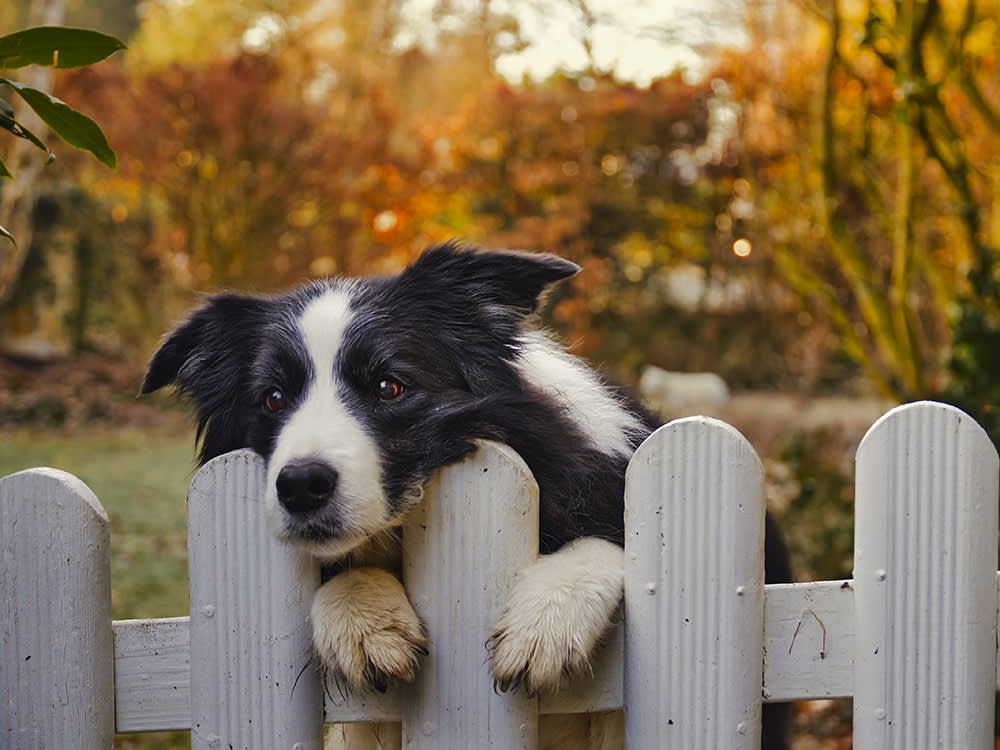Why Does My Dog Bark at the Mail Carrier?
How to get your pup and the mail carrier to be friends.

Share Article
It’s so cliche, you almost can’t believe it’s real: your dog furiously barking at the mail carrier every time you have another Amazon package delivered (so twice a day). In addition to being concerned about the mail carrier’s well-being — and the future state of your Amazon deliveries — you’d like your pup to stop freaking the eff out every time they see a FedEx or UPS truck.
If it’s any consolation, your dog is in good company with this reaction. It’s so common that the image of a dog barking and charging a mail carrier (who’s very worried about protecting the seat of his pants) is a comic trope. But there’s nothing funny about it if it’s your dog — or if you’re the mail carrier!
It's a serious matter especially due to the potential for dog bites: The Postal Service even released a report titled “Postal Service Announces Top Dog Attack Citiesopens in new tab” which shares the statistic that 5,714 postal employees were attacked by dogs in 2018 across the United States. Houston was the city in which the most such bites occurred followed by Los Angeles and Philadelphia.
Why Do Dogs Bark Or Bite Postal Workers?
For some dogs, the original barking is motivated by fear, while for others, it’s a territorial response. Still other dogs lose control because the mail carrier’s repeated appearances bring on a state of high arousal. The crazed behavior can even be the result of frustration; some social dogs want nothing more than to make a new buddy, but are continually thwarted by doors or gates or other barriers to contact.

It’s normal for a dog to bark to alert their social group to anyone approaching the house. What makes dog barking tricky is that from a dog’s point of view, the mail carrier is a repeat offender who keeps coming onto their turf. Dogs rarely meet and get to know this individual, yet the mail carrier comes onto the property over and over again. What begins as an alerting behavior can morph into wanting-to-eat-the-mail-carrier displays as the dog learns that they bark and he goes away. To us, that looks like two separate things, but to dogs, it looks like success: I bark, he leaves. Dogs learn very quickly that barking will make the intruder go away.
The situation can become more serious when the dog acts this way around mail carriers in other contexts. Some dogs learn to associate specific traits with negative feelings about the individual, and react whenever those triggers are present. Then you’ve got a dog who barks around anyone who looks like the mail carrier, or who’s dressed in a similar way. Some dogs generalize to people who smell the same, perhaps from scents inside the truck, a type of shampoo or deodorant, or a cologne. For other pups, any person carrying parcels and papers is treated like a mail carrier.
Generalizing happens with the truck, too. While some dogs distinguish between the mail truck and any other truck, others begin to bark at all trucks. Lots of dogs learn that the mail truck always stops at their house, but the UPS and the FedEx trucks usually drive by.
The majority of dogs who bite do so because they are afraid. Fearful dogs are often especially scared of people who are carrying things, which puts people who deliver the mail at risk. Furthermore, these mail carriers turn their backs and walk away, an action that can give frightened dogs just enough confidence to act on their fears by biting.
To both fearful and territorial dogs (as well as dogs with both issues), uniforms are often associated with unfamiliar people arriving on their property, so the uniform itself can be a trigger that elicits aggressive behavior.
No matter why your dog is acting in this manner, there are things you can do to improve the dog barking and help your dog (and the mail carrier) have better experiences when around each other.
How To Stop Excessive Dog Barking
Prevent your dog from engaging in the problematic behavior.
If it has become a habit, you need to break the habit — and that means avoiding the problem so your dog doesn’t have yet another experience in which they successfully bark at the mail carrier on his way.
Whether you keep your dog in a part of the house where they can’t see the mail being delivered, or cover your windows with poster board to block their view, simple preventive actions will go a long way toward helping them overcome this.
Teach your dog a new response based on a new emotional reaction. If your dog is upset — fearful or irritated by the sight of the postal worker — they will continue to react by barking and growling. So, it’s critical to help your dog change the way they feel about the situation. That can be done by teaching your dog that every time a mail carrier or a mail truck shows up, they get their favorite thing. For most dogs, that favorite item is either treats (perhaps stuffed in a Kong for longer-lasting enjoyment) or a toy such as a tennis ball, squeaky fleece animal, or a rope toy.
If the mail carrier is willing, ask him to toss your pup the treats or a toy, since that’s the best way for them to learn to associate him with good things. Just be aware that while some mail carriers are willing to be involved in this process, others would rather face snow and rain and heat and the gloom of night. If that’s the case, you dole out the treats while your mail carrier safely places that Amazon package on your front stoop.

Karen B. London, PhD, CAAB, CPDT-KA
Karen B. London is a certified applied animal behaviorist (CAAB) and certified professional dog trainer (CPDT) who specializes in working with dogs with serious behavioral issues, including aggression. She has written for a variety of magazines including The Bark, Clean Run, and the APDT Chronicle of the Dog, and has published in scientific journals including Behavioral Ecology and Sociobiology, Ethology, Ecology, and Evolution, the Journal of Insect Behavior, and Insectes Sociaux. She is the author of seven books about dog training and canine behavior, including the forthcoming My Dog's Mystery Adventure: And Other Stories From a Canine Behaviorist and Dog Trainer.


